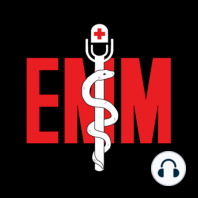5 min listen

Mental Health Monthly #16: Psychosis in the ED Part II
Mental Health Monthly #16: Psychosis in the ED Part II
ratings:
Length:
24 minutes
Released:
Jun 7, 2023
Format:
Podcast episode
Description
Contributors: Andrew White MD & Travis Barlock MD In this follow-up episode Dr. Andrew White, a practicing psychiatrist with an addiction medicine fellowship, and Dr. Travis Barlock, an emergency physician at Swedish Medical Center, discuss mental health holds, psychiatric placement, pharmacologic vs. non-pharmacologic treatments, and outpatient care of psychotic patients. If you missed it, be sure to listen to part I for details on the management of psychotic patients in the ED. Educational Pearls: Mental health holds should be approached on a case-by-case basis; this includes assessing safety risks immediately, over a 24-hour period, and chronically over the last few months. Lastly, collateral information is useful in assessing a mental health hold. What happens after patients get placed in inpatient psychiatry? Typically an antipsychotic is started; in the absence of metabolic risks, patients will often be started on Zyprexa, especially in oral dissolvable form. Doses of Zyprexa ODT start at 2.5 - 5 mg per day. If psychotic patients do not pose direct harm to the environment, they do not necessarily need to be medicated. However, patients will often need medication at some point; for example, some people may be calm during their psychosis but unable to feed themselves or perform other ADLs. The goal of pharmacologic treatment for psychosis is to save the brain; each episode of psychosis damages the brain. Oftentimes, patients will be started on long-acting injectables like aripiprazole or risperidone to give patients 30 days of treatment with one shot. Non-pharmacologic approaches to psychosis are challenging given the nature of the disease. There have been attempts at therapy for psychosis but not have not been hugely successful. Options for support include PT/OT, family support via organizations like NAMI, and other resources for families of patients with psychosis. Outpatient care of patients with psychosis includes contextualizing the events. For example, many people who experience brief psychotic episodes do not go on to develop schizophrenia so it is important to identify a prognosis. On the other hand, someone who has worsening symptoms over several months may require more aggressive treatment. The primary goal of outpatient management of older patients is to reduce the adverse effects of long-term treatments. The CATIE trial in the early 2000s showed that only 25% of people were on antipsychotics by the end of the trial; it is more important to engage patients than focus too much on medications' adverse effects. Summarized and edited by Jorge Chalit, OMSII | Studio production by Jeffrey Olson, MS1
Released:
Jun 7, 2023
Format:
Podcast episode
Titles in the series (100)
Priapism Management: A hard subject to discuss. by Emergency Medical Minute